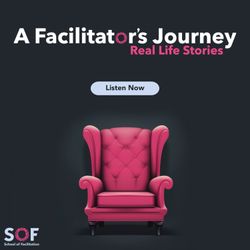Latest episode
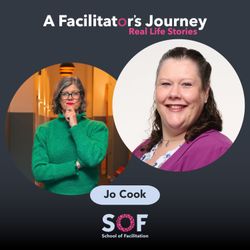
Episode 49: From Newsrooms to Workshops: Jo Cook's purposeful facilitator's path
56:18|This episode is about decision-making in our businesses, the frameworks we use to say yes or no to work and how becoming more conscious in our decision-making is important to cultivate.In this engaging conversation, Jo Cook shares with Kirsty her journey from being a trainee journalist to having a multi-income stream business. Jo shares her experiences transitioning from journalism to self-employment, the challenges of working with family, and living with Ehlers-Danlos syndrome.They emphasize the significance of creating inclusive work environments and the necessity of investing in personal and professional growth. The discussion highlights the need for flexibility in business models and the value of intention in career planning.Chapters00:00 Introduction and Connection02:45 Navigating Networking and Professional Relationships05:16 Career Journey: From Journalism to Learning and Development08:20 The Impact of COVID-19 on Business and Learning10:54 Transitioning to Self-Employment and Business Challenges13:51 The Importance of Intention in Career Planning16:25 Adapting to Change: The Evolution of Business Models19:18 Working with Family: The Dynamics of Sibling Partnerships22:10 Health Challenges: Living with Ehlers-Danlos Syndrome24:52 Creating Inclusive Work Environments27:43 Quick-fire questions33:18 SOFest, TJ 60th Birthday and wrap up!I invite you to grab a cuppa, join me on the pink seat, and tune in your ears.____A Facilitator's Journey is the podcast that looks at how you run your business as a facilitator or trainer.You started this work because you have a passion that you want to share with organisations. However, there is the small detail that you are now running a business and this requires a whole other set of skills and knowledge.Join me, Kirsty Lewis, Founder of School of Facilitation, as I interview trainers and facilitators about how they manage their businesses. I will explore how people run their finances, price their work, scale up, scale down, decide to retire, market themselves, manage clients, and much much more.Key Links:Visit Jo's website HERESign up to TJ's 60th Anniversary conference HEREConnect with Jo on Linkedin HEREVisit the School of Facilitation website HEREDiscover SOFest HEREConnect with me on Instagram HEREConnect with me on Linkedin HEREcontact@schooloffacilitation.com
More episodes
View all episodes
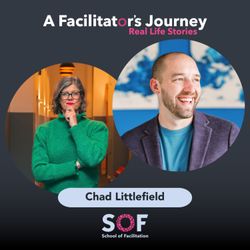
Episode 48: The Importance of Community, Connection and Collaboration
58:18|In this engaging conversation, Kirsty Lewis and Chad Littlefield explore the evolving landscape of facilitation, the impact of AI, and the importance of community and collaboration.They discuss the challenges faced by facilitators in a changing business environment, the significance of positioning and value, and actionable advice for those starting out in the field.The conversation also highlights the upcoming Connector Summit and the importance of investing in personal growth and development.00:00 Introduction and Connection02:42 The Role of AI in Facilitation05:24 Navigating Business Challenges08:32 Positioning and Value in Facilitation11:04 Shifting Business Focus13:56 Personal Stories and Business Insights21:04 Connection Before Content24:20 The Shift to YouTube and Online Engagement29:58 Business Structure and Revenue Streams36:35 Partnerships and Collaborations in Business43:05 The Value of Information and Implementation45:10 Generosity Marketing and Value-Based Pricing47:17 The Scarcity Mindset in Pricing50:16 The Importance of Open Conversations About Money51:46 Positioning and Pricing Strategies56:51 Navigating Economic Uncertainty in Facilitation01:01:04 Quick Fire Questions and Final Insights____A Facilitator's Journey is the podcast that looks at how you run your business as a facilitator or trainer.You started this work because you have a passion that you want to share with organisations. However, there is the small detail that you are now running a business and this requires a whole other set of skills and knowledge.Join me, Kirsty Lewis, Founder of School of Facilitation, as I interview trainers and facilitators about how they manage their businesses. I will explore how people run their finances, price their work, scale up, scale down, decide to retire, market themselves, manage clients, and much much more.Key Links:Visit the School of Facilitation website HEREDiscover SOFest HEREConnect with me on Instagram HEREConnect with me on Linkedin HEREcontact@schooloffacilitation.com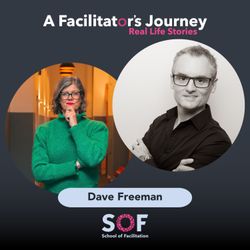
Episode 47: The brutal truth: My first five years as a freelance facilitator
01:03:56|This episode is about decision-making in our businesses, the frameworks we use to say yes or no to work and how becoming more conscious in our decision-making is important to cultivate.In this conversation, Kirsty Lewis and Dave Freeman discuss the journey of transitioning from the corporate world to becoming a freelance facilitator and trainer. They explore the challenges faced in the early stages of building a business, the impact of COVID-19 on the training industry, and the importance of finding a niche. Dave shares his experiences, including the ups and downs of his first year, the evolution of his business, and the lessons learned along the way. The conversation emphasizes the importance of community, resilience, and the brutal truth of running a business.00:00 Introduction and Background02:29 The Brutal Truth of Business05:36 Leaving the Corporate World08:10 Transitioning to Facilitation and Training10:53 Finding Associate Work13:40 Auditioning for Associate Roles16:35 Year One Challenges19:19 Year two and the Impact of COVID22:06 Adapting to Virtual Training24:43 Reflections on the Journey29:58 The Evolution of a Trainer: Year Two to Year Three33:06 Narrowing the Focus: Year Four and Niching42:10 The Balancing Act: Associate vs Direct Work48:10 Quick Fire Insights: Advice and RecommendationsI invite you to grab a cuppa, join me on the pink seat, and tune in your ears.____A Facilitator's Journey is the podcast that looks at how you run your business as a facilitator or trainer.You started this work because you have a passion that you want to share with organisations. However, there is the small detail that you are now running a business and this requires a whole other set of skills and knowledge.Join me, Kirsty Lewis, Founder of School of Facilitation, as I interview trainers and facilitators about how they manage their businesses. I will explore how people run their finances, price their work, scale up, scale down, decide to retire, market themselves, manage clients, and much much more.Key Links:Visit the School of Facilitation website HEREDiscover SOFest HEREConnect with me on Instagram HEREConnect with me on Linkedin HEREcontact@schooloffacilitation.com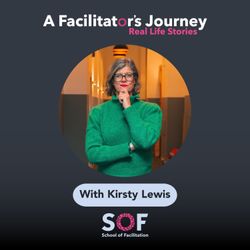
Episode 46: Summer Reflections: My Facilitator's Journey!
22:12|Join me, Kirsty Lewis, founder of the School of Facilitation, as I reflect on my summer of 2025. From facilitating summits in London and Manila to traveling across Australia and New Zealand, I share my experiences, lessons learned, and insights into the world of facilitation. Discover the highlights of SoFest, the challenges of balancing work and travel, and the exciting plans for the future.Key Highlights:SoFest 2026: A celebration of community and learning with 80 participants, workshops, and inspiring speakers. Travel Adventures: Exploring Australia and New Zealand, meeting fellow facilitators, and embracing cultural differences. Lessons Learned: The importance of community, the challenges of professional loneliness, and the need for strategic planning in the business!Visit the SoFest website for 2026 early bird tickets and stay connected for more insights and updates.#Facilitation #SoFest #SummerReflectionsDon't delete below section - to be added to every descriptionI invite you to grab a cuppa, join me on the pink seat, and tune in your ears.____A Facilitator's Journey is the podcast that looks at how you run your business as a facilitator or trainer.You started this work because you have a passion that you want to share with organisations. However, there is the small detail that you are now running a business and this requires a whole other set of skills and knowledge.Join me, Kirsty Lewis, Founder of School of Facilitation, as I interview trainers and facilitators about how they manage their businesses. I will explore how people run their finances, price their work, scale up, scale down, decide to retire, market themselves, manage clients, and much much more.Key Links:Visit the School of Facilitation website HEREDiscover SOFest HEREConnect with me on Instagram HEREConnect with me on Linkedin HEREcontact@schooloffacilitation.com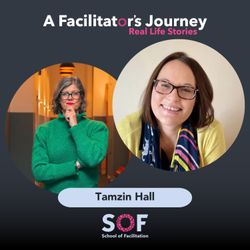
Episode 45: Navigating Neurodiversity in Business
51:53|In this conversation, Kirsty Lewis and Tamzin Hall explore the themes of neurodiversity, the journey of entrepreneurship, and the importance of self-awareness in client relationships. Tamsin shares her personal experiences with neurodiversity and how it shaped her career as a consultant. They discuss the challenges of building a business, the significance of choosing clients wisely, and the value of utilizing downtime effectively for personal and professional growth.Towards the end of the conversation Kirsty and Tamzin explore the complexities of business ethics, the significance of unique selling points, the challenges of loneliness in entrepreneurship, and the importance of continuous personal and professional development. They discuss the ethical dilemmas faced by business owners, the need for authenticity in business practices, and the value of mentorship and accountability in achieving success.TakeawaysNeurodiversity can be supported without a formal diagnosis in the business environment.Choosing clients wisely can lead to a more fulfilling business. Trust your intuition to guide you in client relationships. Utilizing downtime can lead to unexpected opportunities.Building a business takes time and effort, not just a good idea.Resistance to tasks can indicate a misalignment with your goals.Networking and planning are essential for a successful transition to entrepreneurship.Embracing your unique journey can lead to greater fulfillment.Business success is subjective and should be defined individually.Copying someone else's business model is unethical and ineffective.The business landscape can be lonely, highlighting the need for community support.Investing in personal development is essential for business owners.Ethics in business should guide decision-making processes.Continuous learning and development are vital for staying relevant in business.Trusting one's instincts is key to navigating business challenges.I invite you to grab a cuppa, join me on the pink seat, and tune in your ears.____A Facilitator's Journey is the podcast that looks at how you run your business as a facilitator or trainer.You started this work because you have a passion that you want to share with organisations. However, there is the small detail that you are now running a business and this requires a whole other set of skills and knowledge.Join me, Kirsty Lewis, Founder of School of Facilitation, as I interview trainers and facilitators about how they manage their businesses. I will explore how people run their finances, price their work, scale up, scale down, decide to retire, market themselves, manage clients, and much much more.Key Links:Visit the School of Facilitation website HEREDiscover SOFest HEREConnect with me on Instagram HEREConnect with me on Linkedin HEREcontact@schooloffacilitation.com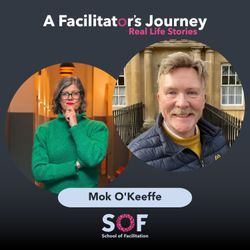
Episode 44: Re-evaluating Success: From corporate to creative to scaling back
47:57|In this conversation, Mok reflects on his journey from corporate consulting to founding the Innovation Beehive, a company focused on unlocking creative potential in organisations. He shares personal experiences of loss, the impact of COVID-19 on his business, and the decision to scale back rather than grow. Mok emphasizes the importance of reevaluating success, prioritizing health, and making intentional life choices. The discussion highlights the challenges of entrepreneurship, the need for self-examination, and the journey towards a more balanced and fulfilling life. Mok tells Kirsty about his journey of overcoming personal and professional challenges, emphasizing the importance of self-care, financial management, and the power of saying no. The dialogue highlights the significance of resilience, personal growth, and the value of building a supportive community.The Birth of Innovation BeehiveNavigating Personal Loss and Career ChangesReevaluating Success and Life ChoicesThe Shift from Growth to Scaling BackIntentional Steps to Scale BackTransitioning from Team to SolopreneurFacing Fear and Rebuilding LifeThe Power of Saying NoNavigating Financial ResponsibilitiesEmbracing New Ventures and CommunityI invite you to grab a cuppa, join me on the pink seat, and tune in your ears.____A Facilitator's Journey is the podcast that looks at how you run your business as a facilitator or trainer.You started this work because you have a passion that you want to share with organisations. However, there is the small detail that you are now running a business and this requires a whole other set of skills and knowledge.Join me, Kirsty Lewis, Founder of School of Facilitation, as I interview trainers and facilitators about how they manage their businesses. I will explore how people run their finances, price their work, scale up, scale down, decide to retire, market themselves, manage clients, and much much more.Key Links:Visit Mok's website HEREVisit the School of Facilitation website HEREConnect with me on Instagram HEREConnect with me on Linkedin HEREcontact@schooloffacilitation.com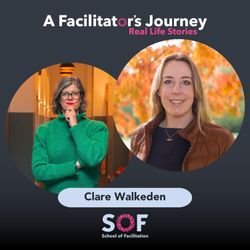
Episode 43: The Power of an Endurance Mindset in Business
01:01:27|In this episode, Kirsty Lewis interviews Clare Walkeden, a consultant, coach, and endurance athlete, about her journey in business and the importance of wellbeing. They discuss the transition from marketing to a focus on wellbeing, the foundations of personal and professional health, and the significance of community and connection. Clare shares her insights on maintaining balance as a business owner and the role of an endurance mindset in achieving success. In this engaging conversation, Kirsty Lewis and Clare Walkeden explore the themes of endurance, chosen suffering, and the emotional challenges faced in both cycling and business. They discuss the importance of discomfort for growth, the need for self-awareness, and the significance of community support. Clare shares her experiences with endurance cycling and how they relate to running a business, emphasizing the necessity of knowing one's values and direction. The conversation also touches on the emotional flatness that can occur with mastery and the joy found in nature and connection with others.Foundations of Wellbeing for Business OwnersThe Importance of Connection and CommunityThe Five Fundamentals of WellbeingBalancing Business and Personal WellbeingEndurance Mindset in BusinessClire's Endurance Sports JourneyThe Concept of Chosen SufferingEndurance Mindset in BusinessNavigating Emotional FlatnessThe Challenge of MasteryFinding Joy in the JourneyBuilding Community and SupportThe Importance of Connection with NatureDon't delete below section - to be added to every descriptionI invite you to grab a cuppa, join me on the pink seat, and tune in your ears.____A Facilitator's Journey is the podcast that looks at how you run your business as a facilitator or trainer.You started this work because you have a passion that you want to share with organisations. However, there is the small detail that you are now running a business and this requires a whole other set of skills and knowledge.Join me, Kirsty Lewis, Founder of School of Facilitation, as I interview trainers and facilitators about how they manage their businesses. I will explore how people run their finances, price their work, scale up, scale down, decide to retire, market themselves, manage clients, and much much more.Key Links:Visit the School of Facilitation website HEREDiscover SOFest HEREConnect with me on Instagram HEREConnect with me on Linkedin HEREcontact@schooloffacilitation.com
